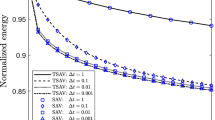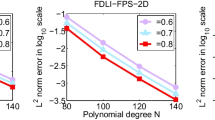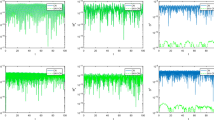Abstract
This paper develops a generalized scalar auxiliary variable (SAV) method for the time-dependent Ginzburg-Landau equations. The backward Euler method is used for discretizing the temporal derivative of the time-dependent Ginzburg-Landau equations. In this method, the system is decoupled and linearized to avoid solving the non-linear equation at each step. The theoretical analysis proves that the generalized SAV method can preserve the maximum bound principle and energy stability, and this is confirmed by the numerical result, and also shows that the numerical algorithm is stable.
Similar content being viewed by others
References
Chen Z, Dai S. Adaptive Galerkin methods with error control for a dynamical Ginzburg-Landau model in superconductivity. SIAM J Numer Anal, 2001, 38: 1961–1985
Chen Z, Hoffmann K. Numerical studies of a non-stationary Ginzburg-Landau model for superconductivity. Adv Math Sci Appl, 1995, 5: 363–389
Chen Z, Hoffmann K, Liang J. On a non-stationary Ginzburg-Landau superconductivity model. Math Method Appl Sci, 1993, 16: 855–875
Du Q. Global existence and uniqueness of solutions of the time-dependent Ginzburg-Landau model for superconductivity. Appl Anal, 1994, 53: 1–17
Du Q. Finite element methods for the time-dependent Ginzburg-Landau model of superconductivity. Comput Math Appl, 1994, 27: 119–133
Ganesh M, Thompson T. A spectrally accurate algorithm and analysis for a Ginzburg-Landau model on superconducting surfaces. Multiscale Model Sim, 2018, 16: 78–105
Gao H, Ju L, Xie W. A stabilized semi-implicit Euler gauge-invariant method for the time-dependent Ginzburg-Landau equations. J Sci Comput, 2019, 80: 1083–1115
Gao H, Li B, Sun W. Optimal error estimates of linearized Crank-Nicolson Galerkin FEMs for the time-dependent Ginzburg-Landau equations in superconductivity. SIAM J Numer Anal, 2014, 52: 1183–1202
Gao H, Sun W. An efficient fully linearized semi-implicit Galerkin-mixed FEM for the dynamical Ginzburg-Landau equations of superconductivity. J Comput Phys, 2015, 294: 329–345
Gao H, Sun W. A new mixed formulation and efficient numerical solution of Ginzburg-Landau equations under the temporal gauge. SIAM J Sci Comput, 2016, 38: A1339–A1357
Gao H, Sun W. Analysis of linearized Galerkin-mixed FEMs for the time-dependent Ginzburg-Landau equations of superconductivity. Adv Comput Math, 2018, 44: 923–949
Gor’kov L, Éliashberg G. Generalization of the Ginburg-Landau equations for non-stationary problems in the case of alloys with paramagnetic impurities. Sov J Exp Theo Phys, 1968, 27: 328–334
Huang F, Shen J. A new class of implicit-explicit BDFk SAV schemes for general dissipative systems and their error analysis. Comput Meth Appl Mech Engrg, 2022, 392: 114718
Huang F, Shen J, Yang Z. A highly efficient and accurate new scalar auxiliary variable approach for gradient flows. SIAM J Sci Comput, 2020, 42: A2514–A2536
Hecht F. New development in FreeFem++. J Numer Math, 2012, 20: 251–266
Heywood J, Rannacher R. Finite-element approximation of the nonstationary Navier-Stokes problem. part IV: Error analysis for second-order time discretization. SIAM J Numer Anal, 1990, 27: 353–384
Jiang M, Zhang Z, Zhao J. Improving the accuracy and consistency of the scalar auxiliary variable (SAV) method with relaxation. J Comput Phys, 2022, 456: 110954
Ju L, Li X, Qiao Z. Generalized SAV-exponential integrator Schemes for Allen-Cahn type gradient flows. SIAM J Numer Anal, 2022, 60(4): 1905–1931
Ju L, Li X, Qiao Z. Stabilized exponential-SAV schemes preserving energy dissipation law and maximum bound principle for the Allen-Cahn type equations. J Sci Comput, 2022, 92: Art 66
Li B, Wang K, Zhang Z. A Hodge decomposition method for dynamic Ginzburg-Landau equations in nonsmooth domains-a second approach. Commun Comput Phys, 2020, 28: 768–802
Li B, Zhang Z. Mathematical and numerical analysis of the time-dependent Ginzburg-Landau equations in nonconvex polygons based on Hodge decomposition. Math Comput, 2017, 86: 1579–1608
Li B, Zhang Z. A new approach for numerical simulation of the time-dependent Ginzburg-Landau equations. J Comput Phys, 2015, 303: 238–250
Liu F, Mondello M, Goldenfeld N. Kinetics of the superconducting transition. Phys Rev Lett, 1991, 66: 3071–3074
Mu M, Huang Y. An alternating Crank-Nicolson method for decoupling the Ginzburg-Landau equations. SIAM J Numer Anal, 1998, 35: 1740–1761
Nochetto R, Pyo J. Optimal relaxation parameter for the Uzawa method. Numer Math, 2004, 98: 695–702
Shen J, Xu J, Yang J. The scalar auxiliary variable (SAV) approach for gradient flows. J Comput Phys, 2018, 353: 407–416
Shen J, Xu J, Yang J. A new class of efficient and robust energy stable schemes for gradient flows. SIAM Rev, 2019, 61: 474–506
Shen J, Zhang X X. Discrete maximum principle of a high order finite difference scheme for a generalized Allen-Cahn equation. Commun Math Sci, 2022, 20: 1409–1436
Tan Z, Tang H. A general class of linear unconditionally energy stable schemes for the gradient flows. J Comput Phys, 2022, 464: 111372
Tang T, Qiao Z. Efficient numerical methods for phase-field equations (in Chinese). Sci Sin Math, 2020, 50: 1–20
Wang Y, Si Z. A convex splitting method for the time-dependent Ginzburg-Landau equation. Numer Algor, 2023. https://doi.org/10.1007/s11075-023-01672-0
Wu C, Sun W. Analysis of Galerkin FEMs for mixed formulation of time-dependent Ginzburg-Landau equations under temporal gauge. SIAM J Numer Anal, 2018, 56: 1291–1312
Zhang Y, Shen J. A generalized SAV approach with relaxation for dissipative systems. J Comput Phys, 2022, 464: 111311
Author information
Authors and Affiliations
Corresponding author
Ethics declarations
Conflict of Interest The author declares no conflict of interest.
Additional information
This work was completed during the author’s visit to Peking University and supported by the National Natural Science Foundation of China (12126318, 12126302).
Rights and permissions
About this article
Cite this article
Si, Z. A generalized scalar auxiliary variable method for the time-dependent Ginzburg-Landau equations. Acta Math Sci 44, 650–670 (2024). https://doi.org/10.1007/s10473-024-0215-y
Received:
Revised:
Published:
Issue Date:
DOI: https://doi.org/10.1007/s10473-024-0215-y
Key words
- time-dependent Ginzburg-Landau equation
- generalized scalar auxiliary variable algorithm
- maximum bound principle
- energy stability




